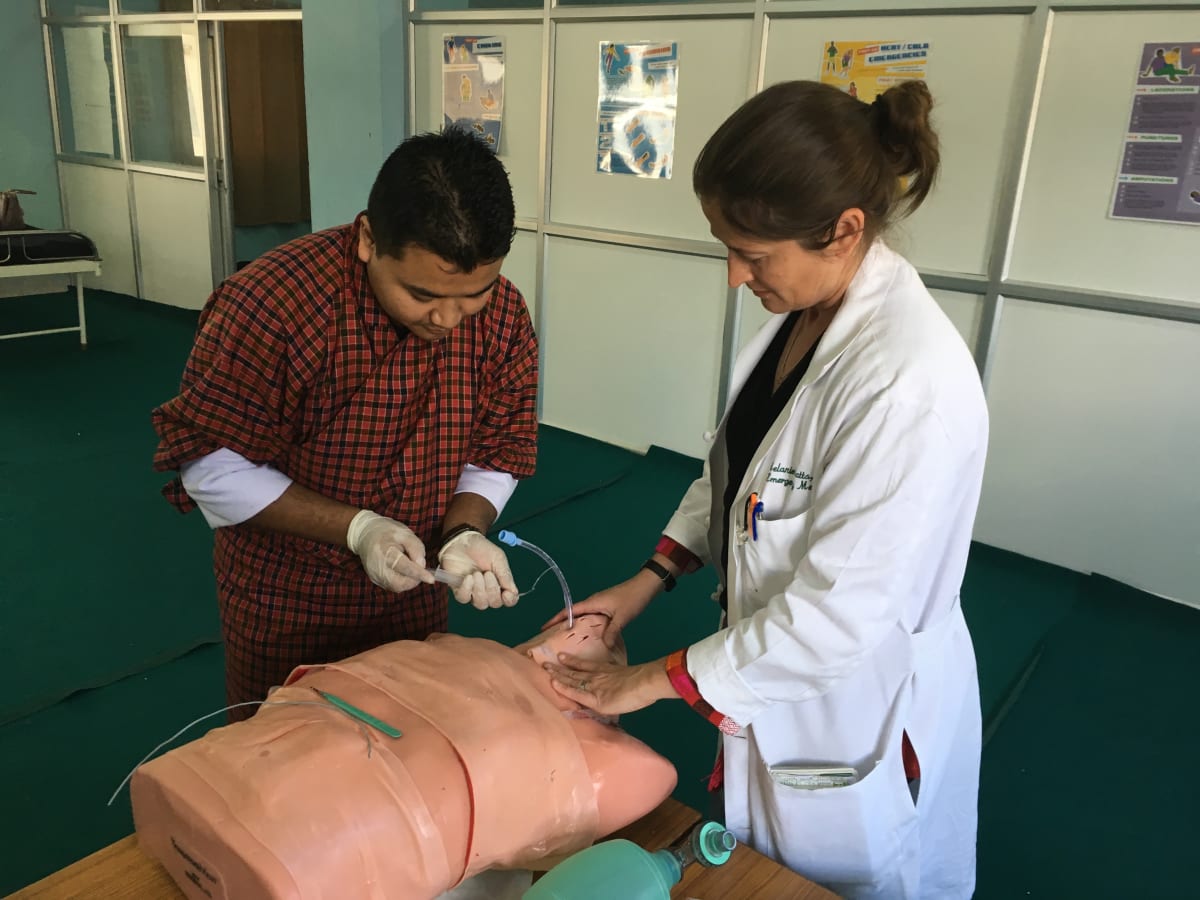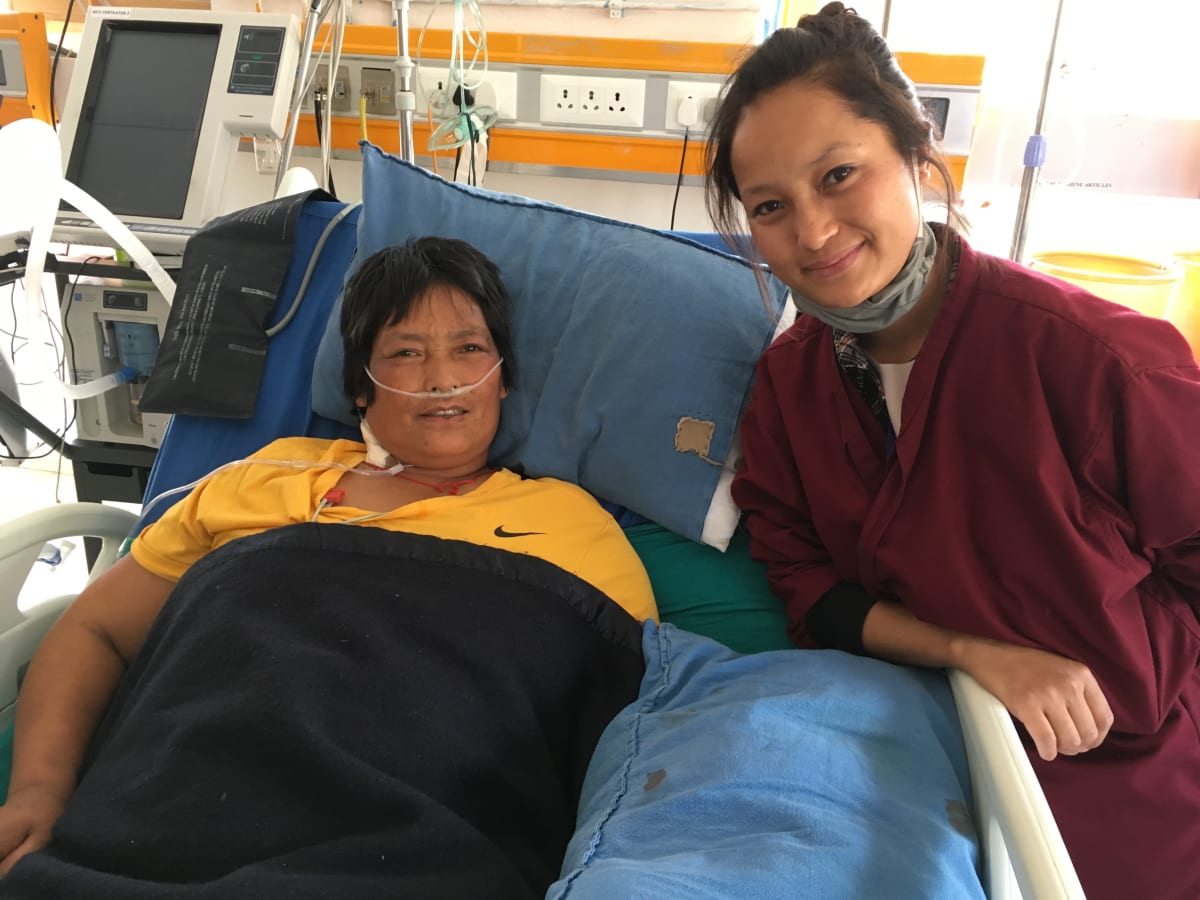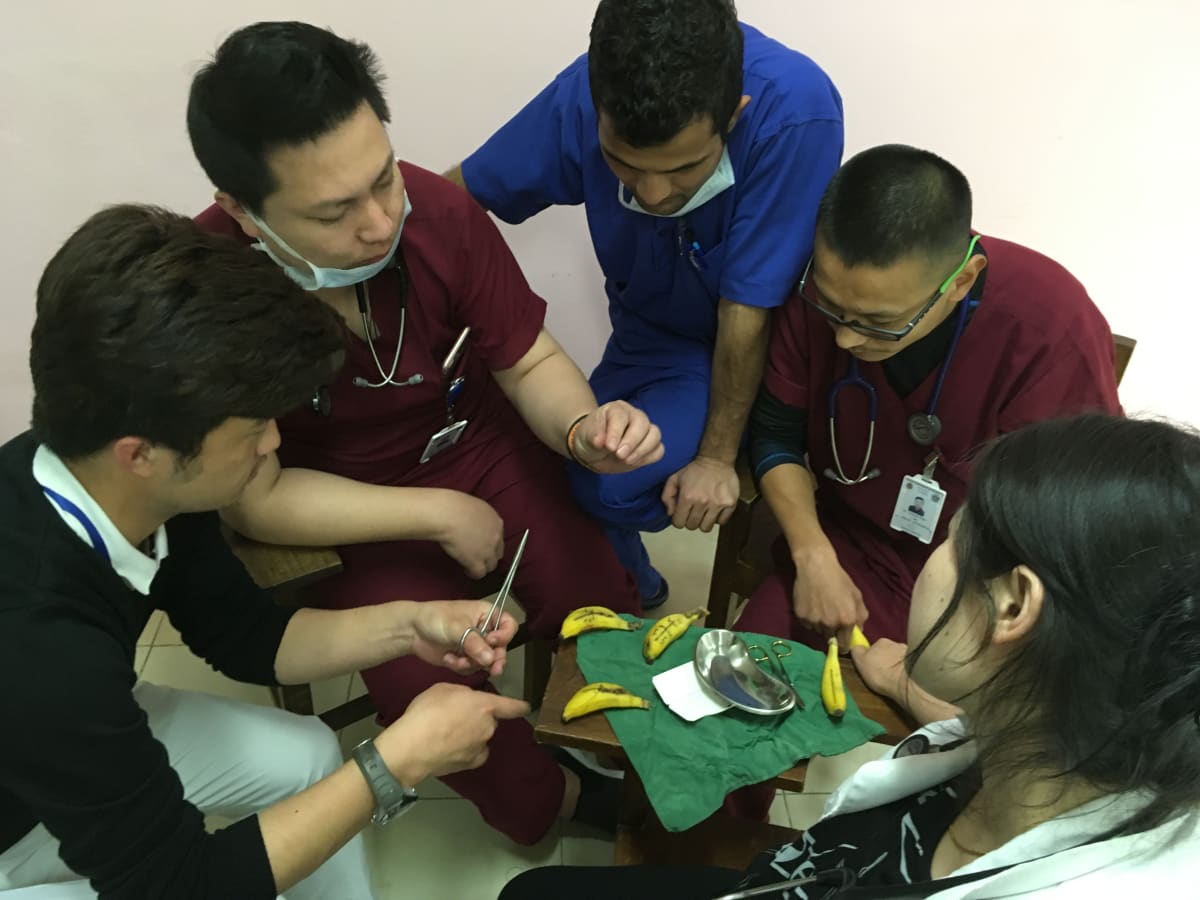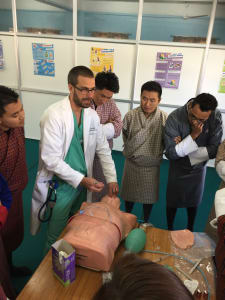The National Referral Hospital in Thimphu is the primary referral hospital in Bhutan to which sick patients are transferred from around the country. As Emergency Physicians we will be volunteering with daily clinical care, training the staff in the ER both via bedside teaching and conference-style modules and simulations. In addition to patient care and teaching, we will be assisting to form the curriculum for the Emergency Medicine Residency which will be started this fall in this hospital.
The National Referral Hospital in Thimphu acts as both the primary emergency medicine facility for the approx. 100,000 people living in Thimphu but also a referral hospital for the country of Bhutan (approx. 800,000).
We will be assisting with daily clinical care and training with the goal of improving the provided emergency care skills of the individuals there and increasing overall capacity for emergency services in Thimphu.
This volunteer position is through a joint venture of HVO & Ministry of Health of Bhutan. We are both Emergency Medicine Physicians who trained and worked in the United States for a few years and are now interested in dedicating our time and skill towards training emergency medical providers. We are potentially interested in staying and working in Bhutan for longer and this initial 4 months will be a trial period to assess to see if the needs at this sight and are skills are a good fit.










As our airplane weaved between snowcapped mountains marked with gold roofed monasteries delicately perched on the peaks and descended just above expansive green trees to make its final sharp turn to land on the runway in Paro, Bhutan. We immediately knew we were in for a unique experience.
We arrived in the Kingdom of Bhutan at the end of the long cold winter eager to spend the next four months learning firsthand about the health of a country previously isolated for centuries now in the midst of a rapid modernization. Our aim was to assess how we could support our Bhutanese Emergency Medicine colleagues, a department of 2, on their mission to expand Emergency Services in this beautiful but geographically remote country. We quickly learned that Bhutan’s emergency medical system is ambitiously expanding despite daunting challenges. It is a small nation, about the size of the state of Maryland, with a total population of less than 800,000 and with 269 doctors. Over the past 50 years, Bhutan has managed to improve health care and access to services that has resulted in a more than doubling of the life expectancy from 32 to 69 years, with similar improvements in infant and maternal mortality. However, marked challenges remain in a mountainous kingdom with geographic limitations in access to higher levels of care due to widely dispersed rural inhabitants and immense transport times on mountainous roads.
Bhutanese Physicians themselves must overcome challenges simply to deliver care in their country. At present there is no in-country medical school. And all residency programs are still in their early stages. Thus, all the physicians in country have completed their training in a variety of neighboring countries, having had to learn another or multiple languages prior to studying medicine in that new language. Many specialists have then learned yet another language to go abroad again to complete specialty training. These health care providers embody the determination necessary to provide medical care in a challenging setting.
Our clinical home base was in the nation’s capital, Thimphu, supervising and teaching emergency medicine in the national referral hospital. All complicated cases were transferred there from across the entire country as it was the only site where advanced imaging, sub-specialists and intensive care were available. Clinical cases were complicated and sick - where trauma ranged from motor vehicle collisions to arrows gone array in bouts of the national sport of archery, to attacks by the local Himalayan black bear. The medical cases frequently included the many mysterious life-threatening manifestations of tuberculosis, to patients presenting with a stroke who’d never seen a doctor before and likely had long standing undiagnosed hypertension, to high altitude related illnesses as the result of life in Thimphu valley at 8000 ft and many surroundings areas being higher. The complexity was magnified when many of these disabling traumatic or medical diagnoses were presenting days to weeks after the initial onset.
Our time spent in the Emergency Department assisting our 2 Bhutanese Emergency Medicine colleagues was divided between clinical work and bedside teaching as well as formal didactics and academic and administrative development. Within the Emergency Department our didactics covered a range of topics with a focus of improving standardization, quality and safety - with collaborative initiation of new patient hand-over and trauma decision-rule protocols. At the hospital level, we were part of regular monthly ACLS course to ensure that all physicians and nurses in every department are well versed in basic resuscitation. At the national level, we were part of an inaugural Bhutanese Basic Trauma Course aimed at improving skills and confidence of physicians at the front lines providing trauma care at rural hospitals and Basic Health posts.
As Bhutan ambitiously sets its sights on scaling up the level of Emergency Care across the entire country, this July will mark the start of both the first Emergency Medicine residency specialist training program as well as an Emergency Medical Responder/Paramedic program. As a result, our primary work involved the outstanding opportunity to build a foundation with our colleagues to develop the curriculum and course planning to help get these programs off the ground.
Despite the many challenges that Bhutan faces to creating an effective emergency medical system and training the personnel necessary for the task, ultimately, we were struck by a great admiration for the many Bhutanese doctors, nurses and technicians who work tirelessly towards achieving these goals to better the health of their people and strengthen their small country. We left, not ready to say good-bye, but with a deep commitment to return to help the Bhutanese build strong sustainable Emergency Care for their increasingly modern future.